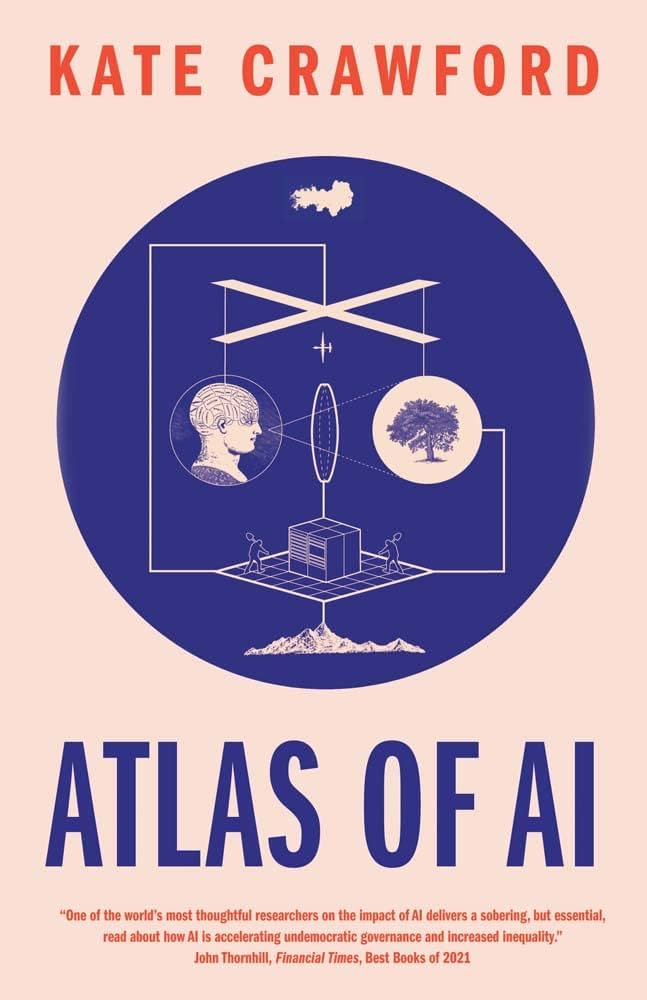Book title: Atlas of AI
Author: Kate Crawford
BOOK DISCUSSIONS
7/23/20253 min read


Thank you Dalalstreet.ai - Discussion supporter
Hyderabad Book discussion Club thanks Dalalstreet.ai for their support and encouragement in conducting book dis- cussions. Not everyone recognises the need to critically read the books. In addition, in the era of the internet, social interactions and human-human communications are missing or at least reduced. Being a SAAS product company, HBDC appreciates Dalalstreet’s efforts to encourage our initiative.
Introduction About Discussant:
Mr Divyanshu Jindal has Masters in Diplomacy, law, and Business from Jindal School of International Affairs. Currently, it works as a Research Associate at Natstart, a geopolitical analysis firm. Earlier, he was associated with Centre for Air Power Studies, a think tank of the Indian Air Force.
How did the discussant get his hands on the book?
Divyanshu started reading books on semiconductor wars that led him to another book,’Digital Silk Road.’ Such sequential readings brought him to ’Atlas of AI.’
Summary
The book is divided into 6 chapters. The book provided the following interesting points to discuss.
Extraction of minerals
Mining costs have been transferred to the next generations in terms of climate costs and health hazards. One such example is the formation of a toxic lake in Inner Mongolia. Rare earth minerals have played a key role in the transformation and explosive growth of China’s world-beating economy over the last few decades [?]. However, the toxic lake -’Baogang’ in Inner Mongolia.
This also exacerbates the geopolitics of water and energy. A lot of water and energy can be diverted from domestic usage to the maintenance of servers.
Crypto mining in China has almost taken over the domestic electricity consumption.
The chapters also discuss whether AI is increasing the burden of maintaining social cohesion.
Increasing the Human Labour
This chapter espouses that AI might not be as intelligent as human beings. Because machines are always trained by humans. its input and output is also predefined. However, such training is inherent in human beings. There is no external stimulus.
An example of Amazon using AI in enhancing its supply chain management and logistics has been discussed. Amazon does not heed to the labor conditions in its logistics division. People were seen with bruises on their hands due to the continuous work.
Role of Data
With the increasing usage of data, it was concluded that private companies take the personal, cultural, and social meaning out of the picture. It is an argument even in the discussion that AI cannot differentiate between objective reality and subjective one. All that matters to the AI.
Emotional Detachment
AI will be used to detect the behaviour of the public. By detecting emotions, ex-ante crime control is also possible.
AI systems are tools of power for the State
1. Power is in the hands of a few big technology companies like Facebook, Google, and Amazon
2. Most of the investments in frontier digital technology are by the military
3. This shows that there is a great confluence between these gig technology companies and the state
How does this book help to understand society?
This book provides a basic understanding of technology-led geopolitics. More precisely, it helps to understand the current clash between the US and China. When it comes to the US, its Senate passed the Chips Act in October 2022, which outrightly banned the export of semiconductor technology to China. From all these measures, the US is trying to slow down China’s technological progress and market domination.
Discussion
Indian data legislations or any measures appear to be reactive without any vision. This aspect has led to some discussion where another participant revealed that India’s internet regulations are not backed by impact assessments, and there is no culture of anticipatory research.
Discussant says that he also understood that there are other technologies about which the media and the government seldom speak.
Harika:
Why aren’t labour laws considered by Amazon in making their working conditions good?
Could you talk more about Potemkin Village?
Divyanshu: Companies save taxes by setting up their industries in those countries. However, people are noticing these issues, and soon there will be a change, I presume. Moreover, the supply of labour is always high, and that can be another reason for workers accepting strenuous conditions.
Vishnu Workers are never asked to work in harsh conditions. Because of high competition, they tend to work hard by themselves.
Binesh: What employees want can also be fed into the development of AI. In that way, AI will develop itself in favour of employees.
Ravi: Surprised to see that the book does not talk about some policies or the need for global organisations. Similar initiatives are taken when there is a fear of AI. Vishnu says that plutonium is tangible where whereas data is intangible. This might be a reason that there cannot be any global organisations regarding AI.
Do you think AI is around us?
They are used almost everywhere - in websites, surveillance cameras, and phones use a lot of it. Though AI is useful in many ways, AI sometimes causes fear. It seems that someone is always tagging us and following us.
